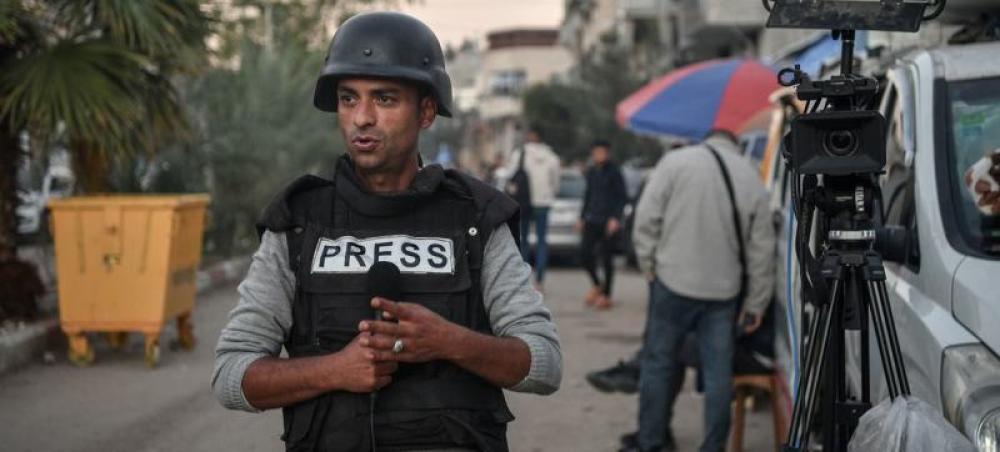Just Earth News | @justearthnews | 03 Nov 2024, 08:50 am Print
 Journalists
Journalists Photo Courtesy: UNDP PAPP/Abed Zagout
Between 2006 and 2024, over 1,700 journalists have been killed around the world, and around 85 percent of the cases did not make it to court, according to a report by the UN Educational, Scientific and Cultural Organization (UNESCO).
The dangers faced by journalists, including risks to their lives, are highlighted each year on the International Day to End Impunity for Crimes against Journalists, which falls on 2 November.
This year, the International Day coincides with the biannual UNESCO Director-General’s Report on the Safety of Journalists and the Issue of Impunity, which recorded a 38 per cent increase in the number of journalist killings compared to the previous study.
In his 2024 message for the Day, UN Secretary-General António Guterres pointed out that Gaza has seen the highest number of killings of journalists and media workers in any war in decades and called on governments to take urgent steps to protect journalists, investigate crimes against them and prosecute perpetrators.
Journalists in Gaza killed ‘at a level unseen in any conflict in modern times’
The war in Gaza inevitably dominated the 2024 UN International Media Seminar on Peace in the Middle East on Friday, an event that has taken place annually for the past three decades, with the aim of enhancing dialogue and understanding between media practitioners and fostering their contributions in support of a peaceful settlement to the Israeli-Palestinian conflict.
In a statement to the seminar, read out by UN head of global communications, Melissa Fleming, Guterres noted that journalists in Gaza have been killed “at a level unseen in any conflict in modern times”, adding that the ongoing ban preventing international journalists from Gaza “suffocates the truth even further”.
Below is an excerpt of the comments made by Cheikh Niang, chair of the UN Committee on the Inalienable Rights of the Palestinian People and the Permanent Representative of Senegal to the United Nations; Guilherme Canela, chief of the section on freedom of expression and safety of journalists at UNESCO, and Mohammad Ali Alnsour, chief of the Middle East and north Africa section at the Office of the United Nations High Commissioner for Human Rights (OHCHR).
Cheikh Niang: One year has passed since the events of 7 October 2023, when Palestinian militants attacked Israel, followed by a devastating Israeli response in Gaza.
Since then, access to information has been severely curtailed. Journalists have been killed, newsrooms destroyed, foreign press blocked and communications cut. Israeli forces, as the occupying power, have systematically dismantled Palestinian media infrastructure, silencing voices through restrictions, threats, targeted killings and censorship.
In the past 380 days, over 130 Palestinian journalists have been killed by Israeli forces in Gaza. These were voices reporting on possible war crimes, silenced before their stories could be fully told.
Journalists in Gaza continue to report on the humanitarian crisis, often at great personal risk, providing the world with an accurate picture of the unfolding tragedy. We honour their courage and recognise that their loss silences their stories and severely limits the public's access to the truth.
Guilherme Canela: The UNESCO Director-General’s Report on the Safety of Journalists and the Issue of Impunity has, for many years, been showing a decrease in the number of journalists killed in conflicts compared with the journalists killed in other situations.
This is not true for this report. Since the report we issued in 2017, it was completely changed because of the situation in Gaza. Journalists were killed because they were telling a story, a story that is relevant for each one of us and of each citizen.
It is very scary to see the level of mistrust that there is against media all over the world and against journalists. This mistrust is happening because of a narrative of political leaders, of religious leaders, of celebrities against journalists and against journalism as a foundational pillar of our democratic values and the protection of human rights.
Mohammad Ali Alnsour: The media has a very important role in starting the accountability process, starting with documenting the crimes and violations and then into investigation and then accountability and eventually to achieve peace. Unfortunately, this has not been the case in the occupied Palestinian territories for four decades now. The issue of access also is not limited to the media and journalists.
Under international humanitarian law, the occupier, Israel, has the obligation to protect civilians, including journalists. We are hearing from very senior politicians and leaders that it is okay to kill civilians in order to achieve insignificant military objectives during that process, which is a violation of proportionality, principle and also military need.
International Day to End Impunity for Crimes against Journalists
Every two years, the awareness-raising campaign for the commemoration of the International Day to End Impunity for Crimes against Journalists coincides with the findings of the report outlining the current state of global and regional impunity.
UNESCO is concerned that impunity damages whole societies by covering up serious human rights abuses, corruption and crime. To uphold the rule of law, governments, civil society, the media and everyone concerned are being asked to join in the global efforts to end impunity.
- Viral Irish food bank photo sparks shocking racist attacks on Indians
- Caught on camera: Two foreigners assaulted in Israel in an alleged racial attack
- Pakistan: Parents heartbroken after court sides with man accused of kidnapping minor Christian girl
- Pakistan: Trafficked 35 years ago, Bangladesh-born woman approaches court against FIA for offloading her from flight!
- Hindu tea worker found bound and bloodied in Bangladesh garden during general elections; investigation underway





-1763561110.jpg)
